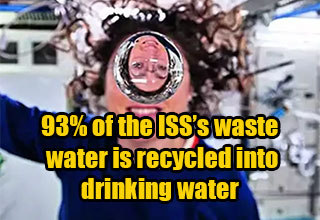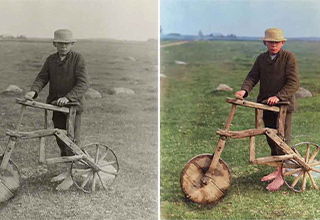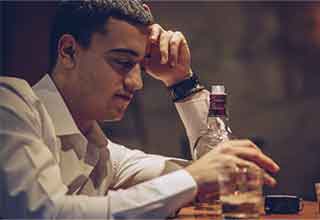In Space No One Can Hear You Scream: 19 Eyebrow-Arching Facts About the ISS
Carly Tennes
Published
07/25/2024
in
wow
Despite housing some of the world's greatest rocket scientists, life aboard the International Space Station isn't all science experiments and spacewalks. Contrary to popular misconception, things get pretty darn gross 254 miles above the Earth, with dirty clothes, body odor, and extensive gas-passing protocols serving as integral parts of living among the stars.
From drug-resistant bacteria to where astronauts' drinking water really comes from, here are 19 hellish facts they don't want you to know about the ISS.
- List View
- Player View
- Grid View
Advertisement
-
1.
 “Astronauts on board the ISS need to sleep near a ventilator fan. Warm air does not rise in space so astronauts in badly-ventilated sections end up surrounded by a bubble of carbon dioxide.”
“Astronauts on board the ISS need to sleep near a ventilator fan. Warm air does not rise in space so astronauts in badly-ventilated sections end up surrounded by a bubble of carbon dioxide.” -
2.
 While there are no pencils alllowed aboard the ISS, you’d be able to find a gorilla suit, bagpipes, and a hidden Geocache aboard.
While there are no pencils alllowed aboard the ISS, you’d be able to find a gorilla suit, bagpipes, and a hidden Geocache aboard. -
3.
 “[Gas doesn’t] dissipate easily in space and a particularly smelly astronaut, while in the space shuttle’s middeck, would position his [rear] next to an air hose that led to the ISS and fire away. He called it ‘sending emails’ to the ISS.”
“[Gas doesn’t] dissipate easily in space and a particularly smelly astronaut, while in the space shuttle’s middeck, would position his [rear] next to an air hose that led to the ISS and fire away. He called it ‘sending emails’ to the ISS.” -
4.
 “Astronaut Chris Hadfield’s wife kept hanging up on his phone calls from the ISS thinking he was a telemarketer. The 3 second delay made her think no one was on the other side of the line when she’d answer. NASA then gave her the ISS’s phone number so her phone read ‘SPACE’ each time he called.”
“Astronaut Chris Hadfield’s wife kept hanging up on his phone calls from the ISS thinking he was a telemarketer. The 3 second delay made her think no one was on the other side of the line when she’d answer. NASA then gave her the ISS’s phone number so her phone read ‘SPACE’ each time he called.” -
5.
 “NASA plans to retire the International Space Station by 2031 by crashing it into the Pacific Ocean.”
“NASA plans to retire the International Space Station by 2031 by crashing it into the Pacific Ocean.” -
6.
 “Time passes slightly slower on the International Space Station relative to Earth. This means that for every 6 months on Earth, a clock on the ISS will read .007 seconds behind.”
“Time passes slightly slower on the International Space Station relative to Earth. This means that for every 6 months on Earth, a clock on the ISS will read .007 seconds behind.” -
7.
 “The reason the International Space Station doesn't fall back to Earth it's because once a month it fires its thrusters to regain the lost altitude.”
“The reason the International Space Station doesn't fall back to Earth it's because once a month it fires its thrusters to regain the lost altitude.” -
8.
 “NASA has employed George Aldrich for 40 years as a 'chief sniffer'. His job being to smell items before they go up to space to make sure no harmful smells will end up on the ISS. His nose also gets 'calibrated' every 4 months.”
“NASA has employed George Aldrich for 40 years as a 'chief sniffer'. His job being to smell items before they go up to space to make sure no harmful smells will end up on the ISS. His nose also gets 'calibrated' every 4 months.” -
9.
 “The ISS recycles 93% of it's waste water into drinking water. Including urine.”
“The ISS recycles 93% of it's waste water into drinking water. Including urine.” -
10.
 “Astronauts heading to the International Space Station (ISS) must learn Russian as a second language.”
“Astronauts heading to the International Space Station (ISS) must learn Russian as a second language.” -
11.
 “Because of its distinctive (and pungent) odour, seafood gumbo was banned on many space shuttle flights. It is allowed onboard the ISS however it can take hours to purge the station of its smell.”
“Because of its distinctive (and pungent) odour, seafood gumbo was banned on many space shuttle flights. It is allowed onboard the ISS however it can take hours to purge the station of its smell.” -
12.
 “TIL of the $23 million dollar toilets designed by NASA for deep space missions. With odor control being a serious issue, NASA pays certified sniffers to smell the toilets after they've been used to evaluate odor-control measures. The lead engineer calls them the ‘unsung heroes of the space program.’”
“TIL of the $23 million dollar toilets designed by NASA for deep space missions. With odor control being a serious issue, NASA pays certified sniffers to smell the toilets after they've been used to evaluate odor-control measures. The lead engineer calls them the ‘unsung heroes of the space program.’” -
13.
 “Astronaut Chris Hadfield (famous for his Space Oddity YouTube video) was blinded for half an hour while on a spacewalk outside the ISS due to drops of anti-fog fluid from inside his visor getting into his eyes.”
“Astronaut Chris Hadfield (famous for his Space Oddity YouTube video) was blinded for half an hour while on a spacewalk outside the ISS due to drops of anti-fog fluid from inside his visor getting into his eyes.” -
14.
 “There is a Geocache hidden aboard the International Space Station. So far, only one person has found it.”
“There is a Geocache hidden aboard the International Space Station. So far, only one person has found it.” -
15.
 “There is no laundry facility on the International Space Station (ISS). Astronauts typically wear their clothes until they are too dirty and then discard them. These clothes are placed in a cargo ship that will eventually burn up upon re-entering Earth’s atmosphere.”
“There is no laundry facility on the International Space Station (ISS). Astronauts typically wear their clothes until they are too dirty and then discard them. These clothes are placed in a cargo ship that will eventually burn up upon re-entering Earth’s atmosphere.” -
16.
 “The International Space Station (ISS) can orbit ‘straight through’ an aurora event. When it happened on 23 February 2016 Timothy Peake, a European Space Agency (ESA) astronaut aboard the ISS, said it was ‘eerie but very beautiful.’”
“The International Space Station (ISS) can orbit ‘straight through’ an aurora event. When it happened on 23 February 2016 Timothy Peake, a European Space Agency (ESA) astronaut aboard the ISS, said it was ‘eerie but very beautiful.’” -
17.
 “U.S. and Russian astronauts on the ISS have separate water supplies. While the U.S. water uses iodine for bacteria control, the Russian water uses silver. If these substances mix, a silver-iodine precipitate forms in the water, which may clog the sublimator in the NASA EMU spacesuit.”
“U.S. and Russian astronauts on the ISS have separate water supplies. While the U.S. water uses iodine for bacteria control, the Russian water uses silver. If these substances mix, a silver-iodine precipitate forms in the water, which may clog the sublimator in the NASA EMU spacesuit.” -
18.
 Bacteria that is “multi-drug resistant’ has been found aboard the ISS, per NASA.
Bacteria that is “multi-drug resistant’ has been found aboard the ISS, per NASA. -
19.
 “Space stations smell like ‘combinations of antiseptic, garbage, and body odor.’”
“Space stations smell like ‘combinations of antiseptic, garbage, and body odor.’”
“Astronauts on board the ISS need to sleep near a ventilator fan. Warm air does not rise in space so astronauts in badly-ventilated sections end up surrounded by a bubble of carbon dioxide.”
19/19
1/19










3 Comments